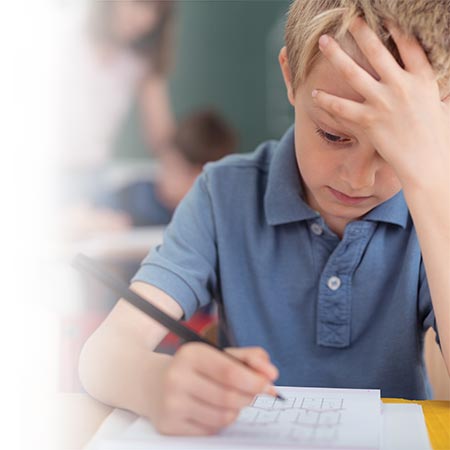Stress and anxiety are sometimes difficult to detect in children. How can the signs be recognized in order to resolve the situation?
Stress and anxiety in children
Stress and anxiety are not exclusive to adults. Today’s fast-paced life does not spare children and adolescents, who must also deal with busy schedules, the pursuit of excellence and success, competitiveness, evaluations, etc.
For several years now, we have noted a unanimous observation: children are more stressed than they used to be. Why is that? This is a fundamental question, but a complex one. There is undoubtedly a host of factors that explain this problem: genetic, environmental and social factors, overexposure to technology, the quest for performance, sedentariness, parental overprotection, etc.
As is the case for adults, exposure to chronic stress can be a threat to the mental health of youth. It isn’t surprising to note a rise of diagnosed cases of depression and anxiety disorders in elementary and high school children.
The sources of stress
In order to thrive, a child needs, among other things, support, safety, guidance and solid reference points. A number of situations can be a source of stress or anxiety, such as:
- the start of the school year
- exam period
- difficulties at school (social or learning problems, bullying, failure, etc.)
- parents’ divorce or separation
- arrival of a younger sibling
- a move or a change of schools
- a trip or living away from home
- a stressful time experienced by the parents
Recognizing the signs
Young children are generally not as well equipped as adults to recognize and express the fact that they are stressed or anxious. This unfortunate situation sometimes makes things worse and hampers access to workable solutions. This is why it is important that parents remain alert to detect anxiety or excess stress in children, in order to resolve it.
Therefore, stress and anxiety are often difficult to detect. Additionally, their repercussions on a child’s health, well-being and quality of life may be underestimated. Their manifestations are extremely varied. However, certain signs may be indicative of too much stress or anxiety:
- excessive insecurity
- reticence, sulking or withdrawal
- difficulty functioning
- decreased academic performance
- negative, demeaning or self-deprecating remarks
- decreased attention or concentration
- significant changes in appetite
- difficulty sleeping
- regressive behaviours (e.g. bed-wetting, wanting the light on at bedtime, wanting to sleep with parents, etc.)
- appearance of tics (e.g. eye twitching, hair twirling, nail biting, etc.)
- disorganization
- agitation or hyperactivity
- anxiety or panic
- behavioural problems (e.g. opposition or aggressiveness)
A sudden change of attitude or behaviour in a child may be a sign that something isn’t right.
Stress or anxiety can affect a child’s physical health: headaches, stomach aches, nausea, worsening asthma or eczema, etc.
Some advice
Here is some advice for parents who wish to offer their child support during a stressful period.
- Encourage your child to express whatever is bothering him/her, and listen to what he/she says without judgment. Your attention, caring and indulgence will help him/her to feel listened to and understood, which will help make him/her feel safe.
- Teach your child how to recognize and name his/her emotions. “I feel worried, stressed, anxious, overwhelmed, etc.”. Finding the appropriate words to describe how he/she feels has a calming effect and can help him/her to find solutions.
- Avoid putting pressure on your child to perform. Your child isn’t perfect? That’s completely normal―and even wonderful! That’s what makes him/her human. Make your child feel accepted and loved regardless of his/her reactions, behaviours, abilities or successes.
- If your child shows signs of being anxious or having difficulty managing stress, call upon the expertise of a professional skilled in this area, such as a psychologist or doctor. This type of process will enable him/her to acquire helpful tools in the present and perhaps for a lifetime.
- Take an interest in stress management exercises and relaxation techniques. Many of them may be accessible and beneficial for children. There are a number of books available on the subject, including some with images that make it easy for young children to understand.
Stress and anxiety are very real challenges for children and adolescents and must be taken seriously. Your pharmacist is always there to help if you have any health-related questions for both young children and adolescents!

